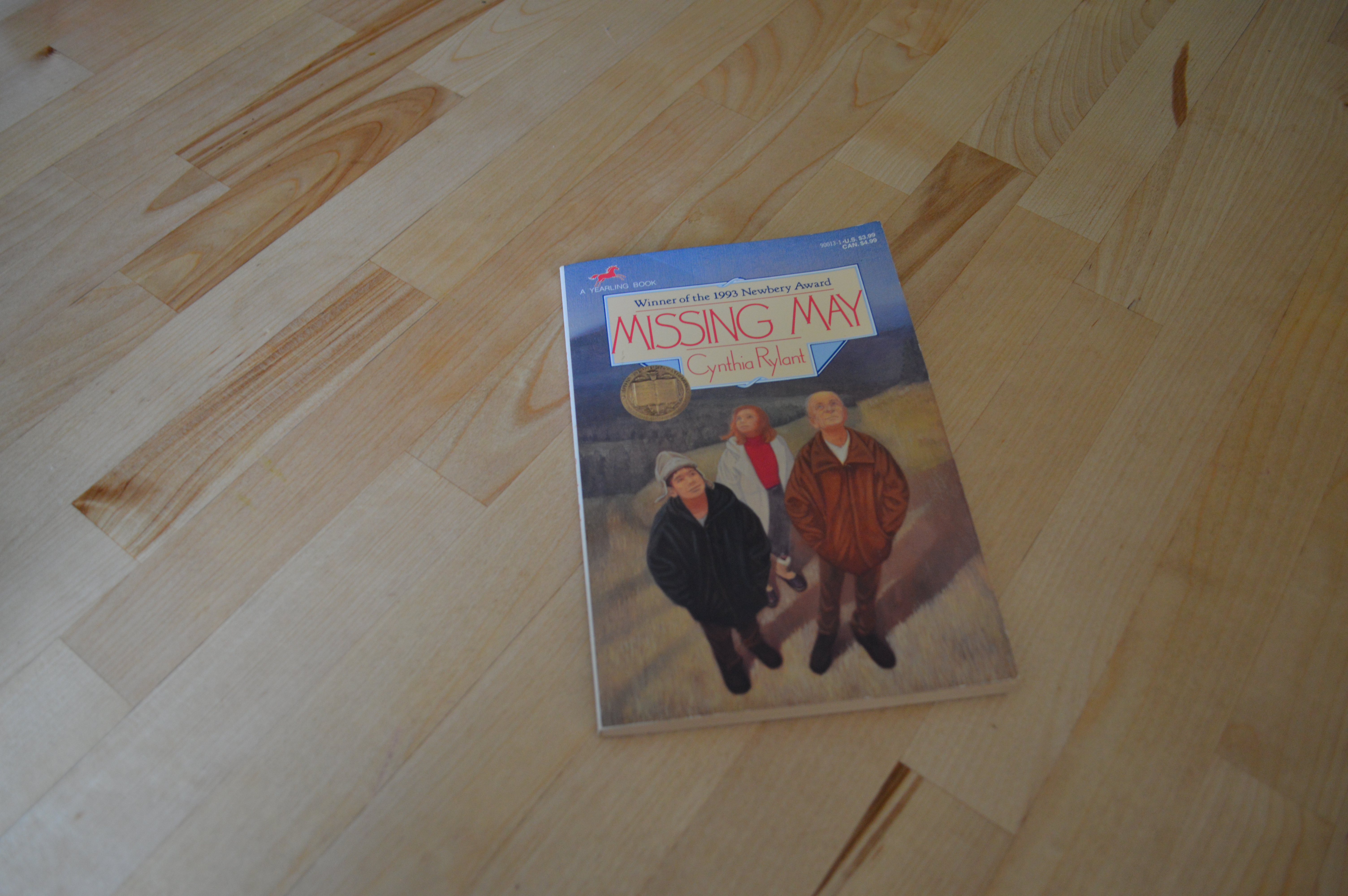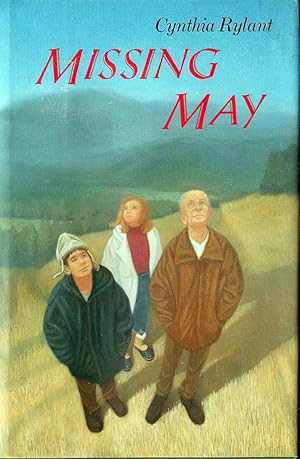
1993 Newbery winner, Missing May, by Cynthia Rylant is about 12 year old Summer and her remaining guardian, Uncle Ob, who are mourning the recent death of his beloved wife, Aunt May. I first read this book in fourth grade (when evidently I was reading a lot of Newberies like Shiloh and A Bridge to Terabithia) and I remember really liking it.
I found it was just as sweet and poignant 25 years later. You could easily read it in one sitting, following Summer and Ob as they befriend her odd classmate Cletus Underwood. Cletus might have a connection to the spiritual realm since he nearly died when he was seven, but definitely has the gift of listening and understanding, as they try to contact May’s spirit and come to grips with her death.
What I liked / What was interesting. I thought the way that Cynthia Rylant wrote the character of Aunt May, who we meet only through the memory of Summer or Ob, was so beautiful.
She’s such a warm and wonderful character that we as the audience are just pulled into missing her right along with Summer. I’m fascinated by just how exactly you can write a character of pure goodness that the audience loves and still feels is human. I think the length of this book (it’s very short) and the nature of it (a meditation on grief) means that we don’t have to experience May’s faults or need May to be “a well-rounded character.”
I suppose May’s biggest fault is that she died, at least in the eyes of Summer. We know that May is an old woman, diabetic, obese, and very poor, so she does fall outside of the usual ideal of a mother in terms of health and vitality, but her love for Summer and Ob was so strong that everything else doesn’t matter.
“May was the best person I ever knew. Even better than Ob. She was a big barrel of nothing but love, and while Ob and me were off in our dreamy heads, May was here in this trailer seeing to it there was a good home for us when we were ready to land. She understood people and she let them be whatever way they needed to be. She had faith in every single person she ever met, and this never failed her, for nobody ever disappointed May. Seems people knew she saw the very best of them, and they’d turn that side to give her a better look.”
(p. 15-16)
I think I love this description of May so much because it’s who I long to be–someone who creates a safe home and makes people feel loved. I have a drive to be practical and caring for sure, but I also can be pretty judgmental and harsh, so that last part about everyone feeling understood and never disappointing is an area I hope I can grow to be more like May.

What were some limitations. I suppose that the only limitation I’d mention would be that the book’s portrayal of the afterlife and the spiritual realm isn’t particularly Biblical (my Wheaton College-ness coming out–people constantly ask there if things are Biblical–whether seriously or as a joke). It has a lot of feeling May’s presence after she dies, and the main journey of the book is to find a spiritualist church and talk to May (which doesn’t work out). So for one thing, it’s probably something you’d want to talk to a younger reader about. It could be a great discussion starter. But I have been listening to a lot of my favorite theologian, NT Wright (for example in Surprised by Hope), who has such a great way of talking about a Christian view of heaven, so I’m particularly aware these days of how many common ways of thinking about heaven can skew our perspective and lead us to miss some important things.
I don’t think Cynthia Rylant is really writing to talk about what happens to people when they die; I think she’s writing about how people deal with a loved one who has died. The emotional and relational journey in Missing May is incredibly authentic and powerful and moving, and that is the real takeaway from the book.

What it teaches me as a writer. What I really found masterful in Cynthia Rylant’s writing of her main character, Summer, was Summer’s relationship with her classmate Cletus. Cletus is a weird dude, weird hat, weird suitcase full of pictures, but he’s incredibly nice, especially to Uncle Ob. Summer isn’t rude to Cletus per se, but there are moments when you feel like she could try a bit harder to be gracious to him. And then toward the end of the book she goes to his house and meets his family.
Summer’s “disgust” about Cletus is pretty subtle, but it makes this revelation and self-reflection so powerful. There are so many ways to make a main character have emotions that the reader can relate to, big emotions, huge highs and lows, really obvious faults and virtues — and those are great and there are characters who are written like that that I adore. But I also love how Summer’s emotions when it comes to Cletus are pretty understated, but then her revelation of how she could have treated Cletus better is so remarkably self-aware and clear-eyed.
The front door opened to us, and standing there was Cletus. And I knew, in an instant, that this was not the same boy who had been coming to us with his battered old suitcase all these weeks. This was a different boy, and I knew even before I set foot inside his house, that here in this place, he was a much-loved boy. …Now, meeting these sweet people, I knew right away it wasn’t them Cletus was ashamed of. It was me. Ashamed of me and my indifference to him, afraid to let his parents see the way I barely tolerated their strange son. Ashamed of the difference between their adoration of him and my disgust. I had not been in that house for five minutes yet, and already I’d learned so much. p. 60 & 61
I think Cynthia Rylant has a lot of deep relational insights that she packs into this little book.

Similarity to other Newbery winners. Missing May has a West Virginia setting like Summer of the Swans and Shiloh. In terms of the themes of grief and poverty and belonging it reminds me most of Dicey’s Song and Sarah, Plain and Tall. I thought the tone of this reminded me of Newbery winning author Kate DiCamillo’s work (especially her amazing trio Raymie Nightengale, Lousiana’s Way Home, and Beverly, Right Here) and Katherine Paterson (especially her Newbery honor book The Great Gilly Hopkins).
The theme of a poor older couple taking in a child and then having to grieve over the loss of the mother reminded me of the beginning of Jayber Crow by Wendell Berry and the film Hunt for the Wilderpeople, both excellent, but much longer and more complicated and mature stories than this one.
Have you read Missing May? What are your favorite books that have helped you come to terms with grief?
*Note* This post contains Amazon affiliate links, which means if you were to buy a book, I’d get a tiny commission at no cost to you. Thanks for supporting Stories & Thyme!*